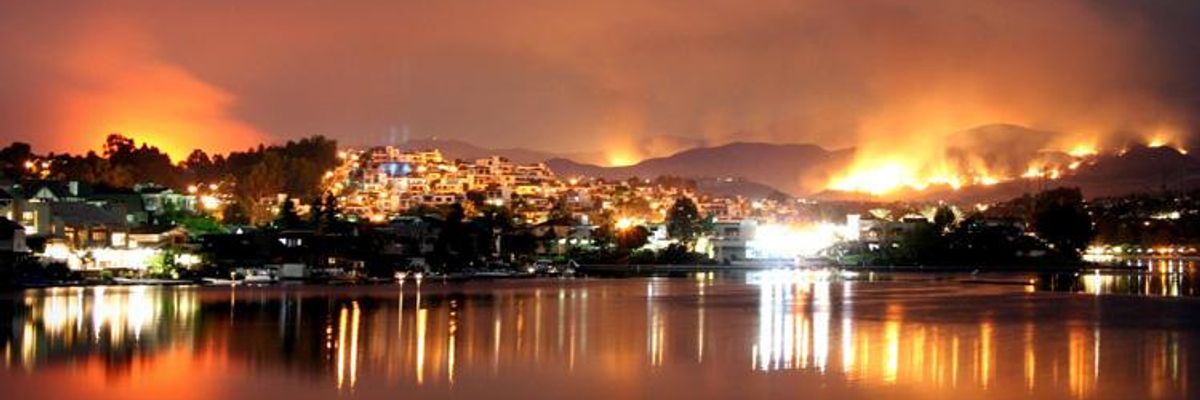San Diego, with condos sprawled along the canyons and cars that have never seen a muddy road, is about as far from New England in spirit and geography as you can get. But I have family there, and the names of the places where people are either fleeing the wildfires or seeking refuge are places I know: Qualcomm Stadium; Encinitas; Fallbrook; Cardiff-by-the-Sea. It is hard for me to picture the Del Mar Fairgrounds, home to high-stakes horseracing and festively lit up for the holidays, as a "Superdome"-like shelter for those evacuating their homes. I shudder to think of the freeways, which in the best of times demand strategic planning to avoid traffic delays, crammed with people leaving or stocking up on essentials. Such a cruel irony it seems that the bluest skies in the nation should be choked with smoke and ash.
I am doubly pained by this disaster because I believe that it didn't have to be this way. Southern California is a place that naturally sustains wildfires. They are part of the cycle of renewal and growth, and are usually self-contained. However, unchecked development in San Diego County-with canyons filled in to become prime real estate and farms and ranchland sold for housing-has razed what would be natural fire breaks.
Given this scenario, one might think that residents would be knowledgeable about fire safety and management. Unfortunately, building in Southern California is a quick cash business, with homes slapped up in no time. No one is thinking about the long haul. Those buying and selling generally don't have local roots and lack the understanding of a place's rhythms that comes over time. Fire paths get built over and the brush is overgrown. Clusters of condos spring up in areas with shrinking water tables. Everyone makes money from the building boom, so there are scant regulations.
For aside from perfect weather and access to the coast, San Diego sells itself on "lifestyle." People are drawn by the promise of unfettered possibility: golf courses on desert land; pools and Jacuzzis; water when you want it. A notion like "limits" or "conservation" does not fly in a consumerist utopia. This ethos both contributes to global warming and thwarts attempts to limit climate change: there is no support or structure for sustainable living.
Global warming can't be specifically blamed for this current conflagration, but experts agree that the higher temperatures, early snow-melt, and long, dry summers associated with climate change will make wildfires more common and more severe. In California, 2006 set records in acreage burned; 2007's total remains to be seen.
A large-scale catastrophe like these wildfires raises the question: where are the first responders? The answer is that more than one quarter of California's National Guard is in Iraq. States have expressed concern over the fact that so many firefighters and other emergency responders are abroad, and this crisis brings that reality home. There is no question that efforts to contain the fire have been hindered not just by a lack of personnel, but the absence of equipment. Helicopters are crucial in fighting fires by dowsing the flames and using chainsaws to cut breaks from above. Again, much of our key aircraft is in the Middle East.
Governor Arnold Schwarzenegger's response has been to call in 1,500 National Guard troops from the California-Mexico border. But these troops were supposed to be guarding our "homeland." The Bush administration has told us that "protecting the homeland" means launching foreign wars and erecting fences against our neighbors. What about securing our citizens against natural disasters? What about preserving the integrity of our land and resources so that wildfires, floods, and hurricanes are less destructive? What about creating a culture of awareness that our choices about how people build and interact with our environment have consequences? That is a "homeland security" policy I would support.

